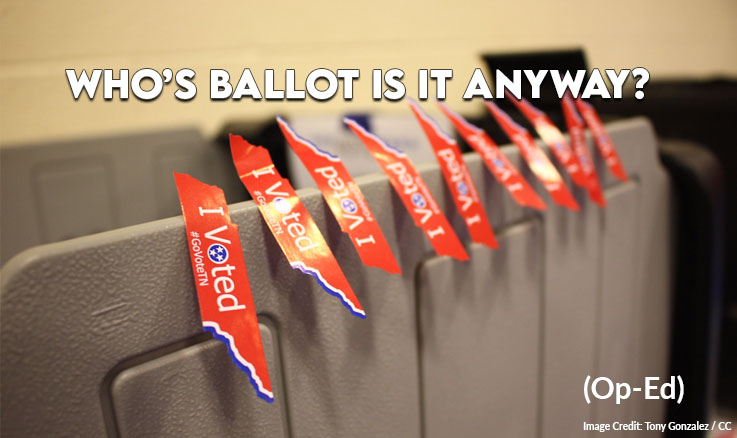Image Credit: Tony Gonzalez / CC
By Thomas Antkow [Special to The Tennessee Conservative] –
Let’s begin by stating what in my opinion is, the obvious.
If you find the rules, regulations, ways, or means to cast a vote in the modern era convoluted or confusing, those rules were probably modified or tampered with by either bleeding heart liberals, self-serving politicians, or progressive wannabes.
In the United States, Election Day is supposed to be the annual DAY set aside by law for the general elections of federal and sometimes local public officials. It was initially statutorily set by the Federal Government as “the Tuesday next, after the first Monday in the month of November” equaling the Tuesday occurring within November 2 to November 8’. According to Wikipedia, “in 1792, federal law permitted each State legislature to choose Presidential electors any time within a 34-day period before the first Wednesday in December. Three cheers for legal mumbo-jumbo! Sometimes separation of powers embraces logic, sometimes not.
A November election was convenient because the harvest would have been completed. Most severe winter weather, impeding transportation, would not yet have arrived. New election results also would roughly conform to a new year. Tuesday was chosen as Election Day so that voters could attend church on Sunday, travel to the polling location (usually in the county seat) on Monday, and vote before Wednesday, which was usually when farmers would sell their produce at the market. Originally, states varied considerably in the method of choosing electors. Gradually, states converged on selection by “some form of popular vote”. Wow! Obviously, lawmakers with a degree in their briefcase had a hand in drafting this one. Here-in lies the rub. Is it conceivable that some constitutional law professor(s), well versed in the “Rules for Radicals” and a working knowledge of federal statutes might have noticed the phrase “in a 34-day period” and ventured to take the early voting concept to new heights. Enter 6-week early voting, drop boxes and bastardized absentee balloting.
According to “published sources” ‘development of the telegraph funded by Congress in 1843 and successfully tested in 1844, a technological change that augured the future of instant communication nationwide’, changed everything. Especially the necessity to travel long distances to cast a ballot. To prevent information from one state from influencing Presidential electoral outcomes in another, Congress responded in 1845 by mandating a uniform national date for choosing Presidential electors. Congress chose the first Tuesday after the first Monday in November to harmonize current electoral practice with the existing 34-day window in federal law, as the span between Election Day and the first Wednesday in December is always 29 days. The effect is to constrain Election Day to the week between November 2 and 8 inclusive. Beginning with Presidential elections, states gradually brought most elections into conformity with this date.
The Twentieth amendment, passed in 1933, changed the beginning and end date for the terms of the President, Vice President, Congressmen, and Senators. It did not affect the timing of Election Day.
Simply stated. Absentee voting is voting by people who are absent from the polling places on the day of an election. The first instance of absentee voting came during the Civil War, when Union soldiers were given the opportunity to vote in home district elections. Attitudes towards absentee voting have certainly changed. At first, absentee balloting was restricted to individuals doing active military service. However, last in Vermont (1896) and Kansas (1901 and 1911) extended the option to anyone who had a valid reason for being away from his home precinct on election day. This has become universal. The trend has continued towards a more liberal interpretation, including absence due to illness or infirmity. Oregon voted in 1998 to make absentee voting moot by eliminating all physical voting places and conducting all elections by mail. And so “IT” began. Could someone close the door please? I feel a chill in here.
Based on what I am reading. It seems that giving everyone, with a desire to vote a full travel day to reach the polling place was not only possible then but reasonable even in times of extremely slow transportation. Voting when absent might still make sense ONLY when it was impossible to cast your vote in person. (SEE “valid reason”). Nowadays, a reasonable excuse is still deployment due to military service or absence from home due to employment assignments, not family vacations. However, making reasonable accommodations for ill health, issues of aging, disability or when it is completely impossible to find a means of transportation on a day that everyone knew in advance was set aside for the purpose of voting, has been totally transformed. Leaving time for fraud and abuse has become a distinct possibility. Voter suppression by minimizing temptation? I think not. Creating higher turnout by harvesting ballots? Balderdash!
Finally. Since it has become fashionable, probably due to boredom or simply a total lack of imagination to “make everything old new again”, why not revive the past and create an honest above-board future? Could someone please close that door now? These goosebumps are killing me!

About the Author: THOMAS ANTKOW is currently a freelance writer and produced and hosted his own daily radio show on KCSF AM 1300 and co-hosted talk shows for KVOR AM 740 for Cumulus Broadcasting in Colorado Springs. He can be reached at taradio863@gmail.com. You can subscribe and follow Tom Antkow’s free newsletter at: “antkow.substack.com”.



